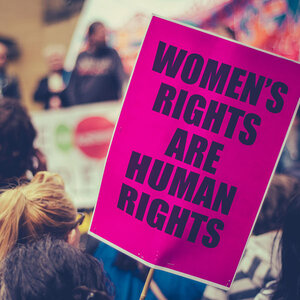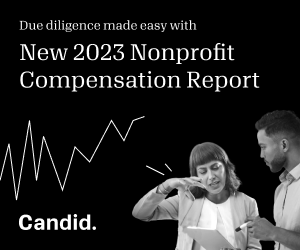Meet the Southern warriors for the future we deserve
In the face of relentless and intersecting attacks on gender-affirming health care, trans youth and trans communities, abortion access, and voting rights, many of us are spending Women’s History Month contemplating an uncertain future.
On the one hand, we’re seeing legislative attacks on bodily autonomy. For example, this month the Florida GOP introduced a bill that would ban girls from talking about their periods in school under the “Parental Rights in Education'' law. Copycat bills banning instruction on gender identity and sexual orientation like the Florida law are being introduced in many more states across the country. On the other hand, we are filled with awe for and indebted to the women, femmes, trans, and gender-expansive people of color defending our freedoms in some of the most hostile environments.
Organizations like Florida Rising, Florida For All, and Equality Florida are declaring a state of emergency, building coalitions to fight back and protect their communities. Our grantees are showing us how to dig in deeper, build wider, lock arms across sectors and state lines, and act not out of fear but with purpose and clarity, resolution, and hopefulness.
In Kansas last August, Groundswell Fund grantee Unite for Reproductive & Gender Equity (URGE) defied every expectation by helping protect abortion rights in a red state. URGE, a youth-centered reproductive justice organization galvanized over half a million young voters of color in an off-season election, and voters decisively rejected an amendment to the state constitution that would have stripped away abortion protections and eliminated access to critical reproductive health care.
Meanwhile, in Georgia, Black Trans Fund and Groundswell Fund grantee I Am Human Foundation offers assistance with name changes, gender marker changes, and updates to state identifications so that trans and gender-expansive people can register to vote in upcoming elections. And legal organizers from If/When/How’s Repro Legal Defense Fund provide bail support for people of color who are criminalized for self-managed abortions. Many of the communities they serve have long been in a “post-Roe” reality, where oppressive systems and structural inequity prevent and complicate access to necessary reproductive care.
Over the last 20 years, Groundswell Fund has become one of the largest funders of the Reproductive Justice Movement, proving the genius and necessity of intersectional funding organizing. As legislative attacks on Black, Brown, trans, and queer communities continue in the South, Southwest, and Midwest, we look to the grantees on the front lines in those areas to lead the way.
Groundswell is a national leader in maintaining our funding commitment to those areas. Through our grantmaking, capacity building, and funder organizing work, Groundswell allocated $15 million to 252 organizations across 50 states and territories, working at the local, state, and federal levels in 2022. We focus on work led by Black and Indigenous women and trans and gender-expansive people of color because we believe the people living at the sharpest cross hairs of different oppressions have the clearest insight into dismantling systemic oppression.
Groundswell reaffirms our longstanding commitment to ensure that Black organizing, especially efforts led by Black women and Black transgender people, receive between 40 percent and 45 percent of the resources we award every year—more than any other demographic group.
We must think beyond philanthropy as usual. Women’s history in philanthropy has often been white-focused. A 2020 Ms. Foundation for Women study on philanthropic giving in support of women and girls of color in the United States showcased the urgent need to hold philanthropy accountable to communities, movements, and the changes they seek.
The report revealed that the total philanthropic giving to women and girls of color is just $5.48 per year for each woman or girl of color , or just 0.5 percent of the total $66.9 billion given by foundations. And the Chronicle of Philanthropy recently highlighted research showing nonprofits serving people of color or led by nonwhite executive directors have a harder time securing funding.
Our grantees help pass many policies—but for us, the win is seeing an organized grassroots base that can hold people accountable, to make sure things are implemented, to make material change in people’s lives.
It’s time to significantly increase the resources under the decision-making power of Black people who have a track record of accountability to Black communities. That entails moving massive amounts of money to Black-led organizing rooted in and trusted by the community, and doing so without applying disproportionate levels of scrutiny, pressure, and red tape.
Philanthropy can take a cue from Reproductive Justice Movement leaders. Fund the efforts of full-spectrum midwives, doulas, and birth workers of color, restoring the traditional role of birth workers around abortion care and contraception. Fund organizations educating communities and organizing around the issue of self-managed abortion. These folks are taking on huge legal risks simply by educating people on self-managed abortion, and we believe we have a duty to stand by them. Fund organizations advancing contraception justice and gender-affirmation. Issues of bodily autonomy will continue to be weaponized against communities of color.
If we are to win bodily autonomy and defend democracy, philanthropy must focus on multiyear, general operating grants that fund intersectional work to scale. Siloed, one off programmatic grants will not be sufficient to counter the 50 years of long-game strategy we are seeing come to fruition from anti-abortion advocates. Funding for racial justice must be increased exponentially, sustained and for the long term, and focused in areas where abortion is now illegal.
We are in a fight for the soul of our society and the spirit in which we will govern ourselves. Join us in fighting for the future we all deserve: a multiracial, pluralist, feminist democracy.
Quanita Toffie is senior director of Groundswell Action Fund and is involved in its integrated voter engagement program, which equips reproductive groups with voter engagement skills and technology.






